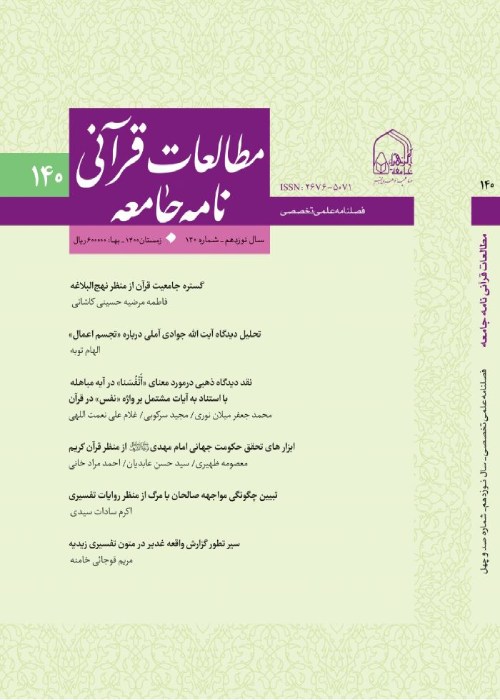فهرست مطالب
نشریه مطالعات قرآنی نامه جامعه
پیاپی 112 (زمستان 1393)
- بهای روی جلد: 50,000ريال
- تاریخ انتشار: 1393/11/28
- تعداد عناوین: 7
-
صفحه 6
-
صفحه 105
-
صفحه 139
-
Page 9The arguments for the existence of God constute one of the most significant issues of the Islamic philosophy to which part of works in the Islamic philosophy has been devoted, including the works of Ibn Sina. In this paper I have collected the arguments for the existence of God in the works of Ibn Sina and classified them in terms of their relaon with the rejecon of vicious regress, each being logically analyzed and evaluated as to their soundness.Keywords: Ibn Sina, Regress, Proof of God, Primary Cause, The Necessary Being
-
Page 59The Faith (iman) is a belief and hearty submission with certude accompanied by an aachment to its object(s) based on foundaons such as certainty, jusce, paence, and jihad (struggle). The firm faith (al-iman al-rasikh) which amounts to certude, firmly rooted in ones soul, is one of the most influenal factors in the perfecon of the soul, in both its theorecal facultyin cognizing wisdom and the realies of the existenceand its praccal facultyin complying with its dues. Without faith the soul cannot gain real perfecon; on the contrary, it might degrade into an animal status, since on the one hand, faith is crucial for making right choices, having commitments and resolve in virtue of its doxasc component, and on the other, it is crucial for the soul being steadfast on the right path in virtue of its foundaons, and this is all the soul needs for its perfecon. A study of the Quranic verses and the tradion and the biography of people who were prominent in the perfecon of their soul and their faith also confirms the role of the faith in the perfecon of the soul.Keywords: Faith (Iman), Soul, The Perfecon of the Soul, Certainty, Jusce, Paence, Jihad
-
Page 81Shahab al-Din Suhrawardi is an Islamic philosopher with an Illuminaonist (ʾishraqi) style. He is concerned with the knowledge of the soul and its knowledge, paying aenon to its refinement and training. He gives more aenon to knowledge by presence (al-ʾilm al-ḥużūrī) than philosophers before him. He broadens the scope of knowledge by presence. He makes it explicit that our visual knowledge, God's knowledge of his creatures and many other things are examples of such knowledge. On the other hand, he advises seekers of knowledge to master reasoning and argumentaon in order to be complete Illuminaonist philosophers. Therefore, the issues of knowledge by acquision (al-ʾilm al-ḥuṣūlī), i.e. concepon and judgment, are very much like issues in the Peripatec philosophy, except for some criques and comments that Suhrawardi has presented under Illuminaonist Rules.Keywords: Knowledge by Presence, Knowledge by Acquision, Peripatetic philosophy, Illuminaonist philosophy
-
Page 105According to Mufid, one of the most significant sources of religious knowledge is the reason. It is so important for him that in his view, in cases of the conflict between reason and tradion, it is the reason that is preferred. However, Mufid holds that the exclusive employment of reason in the deducon of religious beliefs is unfoundedhe maintains that the reason cannot reveal true religious beliefs without the support of reason. He denies any sort of innate knowledge and takes knowledge of God to be a maer of acquision. He interprets .away hadiths concerning the world of DharKeywords: Mud, Sources of Knowledge, Reason, Innateness
-
Page 119The present paper shows that the theory of Forms (muthul) opens a new chapter in Platos and Suhrawardis ontologies and epistemologies. The paper discusses their movaons for such a theory, comparing its influence in their respecve ontologies and epistemologies. I show that Plato takes the Forms to be the real objects of knowledge, maintaining that the material world cannot be constant and thus it cannot be the object of knowledge. Since in his view the Forms are objecve enes, he had to explain their ontological statusthey are, in his view, below the Form of Good and above the material world. In his picture of the hierarchy of the existence, Suhrawardi takes nur al-anwar (the light of the lights) to be on top, followed by p ure lights called al-anwar al-qahira (dominant lights). The dominant lights are complete immaterial beings formed both vercally (ṭūlī) and horizontally (ʾarżī). The horizontal intellects are, in his view, the Platonic Forms or Arbab al-Anwẚ (Lords of the Species) connecon with which enables one to gain true wisdom.Keywords: Ontology, Epistemology, Plato, Suhrawardi, Forms (Muthul), Nur al Anwar (the Light of Lights)
-
Page 139Mutahari summarizes the idea of posivism by two principles: the rejecon of self-evident proposions, and constraining the reasoning to one from a parcular to a general. Mutahari presents counterexamples that should be accepted by posivists and hereby undermines the principles. The main objecon that Mutahari raises against posivists is that they take sense experience to be the only way of knowledge, whereas there are proposions that obtain without any appeal to such experience. Moreover, the formaon of empirical proposions depends on the acceptance of self-evident proposions.Keywords: Posivism, Mutahari, Empiricism, Epistemology


